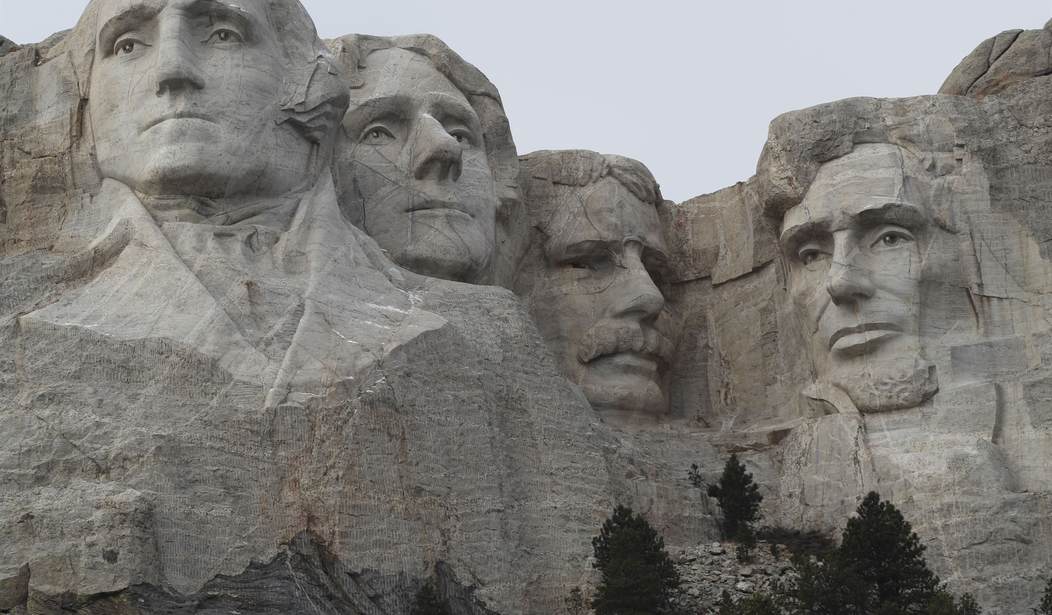This year, President Donald Trump will celebrate the Fourth of July at Mount Rushmore, honoring the achievements of the four great American presidents whose visages are etched in that inspiring monument. Meanwhile, righteous anger over the police killing of George Floyd has devolved into looting, riots, and wanton destruction. Vandals have defaced statues of each of the four great presidents celebrated on Mount Rushmore, at times explicitly echoing the logic of The New York Times‘s “1619 Project” — that America’s true founding did not come on July 4, 1776, but on a date no one remembers in 1619 when the very first black slaves set foot in Jamestown.
The nut and kernel of the rioters’ message isn’t that police wrongly killed George Floyd — Americans agree on that, and we hope the justice system rightly convicts Derek Chauvin and his three police accomplices. No, the Black Lives Matter argument has moved from “Police are Racist” to “Defund the Police!”, from “Down with Confederate Statues!” to “Down with George Washington!”
Laments over George Floyd are so yesterday. Apologizing for being white is in. Nikole Hannah-Jones, the founder of the “1619 Project,” revealed her true colors in a 1995 op-ed condemning the “white race” as “barbaric devils” and comparing Christopher Columbus to Adolf Hitler. Apparently completely unaware of the fact that Christians opposed the enslaving of Native Americans and led the abolitionist movement, Hannah-Jones claimed, “Using Christianity as their excuse, the white race denied the native people their humanity.”
True to this form, The New York Times published an extensive history of all the horrors connected to Mount Rushmore. The article noted that the monument was built on land that once belonged to the Lakota tribe. The prospectors who seized the land in the 1870s violated the Fort Laramie Treaty of 1868. In 1980, the Supreme Court ordered that the U.S. government give more than $100 million to the eight tribes involved, but the tribes refused the money, demanding the land back, instead.
The article noted that the monument’s sculptor, Gutzon Borglum, “formed strong bonds with leaders of the Ku Klux Klan” in order to raise money for his Stone Mountain project. Naturally, the article also noted all the evils of the four presidents on Mount Rushmore: George Washington, Thomas Jefferson, Abraham Lincoln, and Theodore Roosevelt.
But each of these titans of American history has a complicated legacy. Washington and Jefferson were slaveholders. Roosevelt actively sought to Christianize and uproot Native Americans as the United States expanded, Professor [Gene A.] Smith said. “He was a racist,” he added.
The Times presented a particularly ugly Roosevelt quote and noted that “some have criticized” Lincoln’s Emancipation Proclamation as “reluctant and late.” Oh, and the article had to mention Lincoln’s involvement in the Minnesota Uprising, in which 300 Native Americans were sentenced to death for allegedly attacking white settlers. Lincoln got the number of condemned down to 38.
All of these facts are true, of course. The United States’ record on respecting the rights of Native Americans has been abysmal, and the Supreme Court was right to try to correct that record. Yet none of this erases the concrete good America has done for the world. The Fourth of July is worth celebrating in spite of the U.S.’s historic abuse of Native Americans. It is worth celebrating despite America’s history of race-based slavery, religious bigotry, and abortion — and each of the presidents on Mount Rushmore explains why.
As Rioters Topple Statues of George Washington, DNC Singles Out Another Symbol of ‘White Supremacy’
George Washington
First, George Washington represents the nobility of America’s Founding. He held the rag-tag Continental Army together in the devastating winter at Valley Forge. Washington’s majestic fortitude and humility inspired the troops despite constant defeats. He personally led soldiers into combat, risking life and limb.
While Washington’s bravery and his role in the Revolutionary War would justify monuments across America, his humility in turning down unlimited power and helping to set up a republic made him a world-historical hero. A painting in the U.S. Capitol commemorates the moment when Washington handed in his military commission, becoming a civilian in his role as the first president. He declined to run for re-election after two terms, setting a precedent followed by every president except Franklin Delano Roosevelt.
Yet his greatest moment arguably came on March 15, 1783. More than a year after British General Lord Cornwallis surrendered at Yorktown, the Continental Army had not been paid for its service. Rightly angry, the troops hatched a scheme to overrun Congress and install Washington as king of what would become the United States. Washington put them to shame. He urged the army to trust the people’s elected representatives, rather than opening the “floodgates of civil discontent.”
He reportedly pulled out a letter to read the troops, but needed his eyeglasses to read the text. “Gentlemen, you must pardon me. I have grown gray in your service and now find myself growing blind,” the imposing commander declared. Many officers wept, and the mutiny was over. Washington’s letters to Congress won his officers five years of full pay for their service.
Thomas Jefferson
Much has been made of Thomas Jefferson’s ownership of slaves, and of his raping his slave, Sally Hemmings. The man’s moral record is besotted, to be sure. As a Christian, I find Jefferson’s tearing up of the New Testament particularly odious. Even so, Jefferson is a monumental giant of American history, and he deserves to be celebrated, regardless of his failings.
Thomas Jefferson was the lead author of the Declaration of Independence, the seminal document that founded the United States on the notion that “We hold these truths to be self-evident, that all men are created equal, that they are endowed by their Creator with certain unalienable Rights, that among these are Life, Liberty and the pursuit of Happiness. — That to secure these rights, Governments are instituted among Men, deriving their just powers from the consent of the governed.”
The United States has not lived up to this ideal, but the logic of this foundational statement unraveled the notorious evil of race-based slavery.
Jefferson also served as America’s third president. He essentially founded the Democratic Party, and he made the Louisiana Purchase, securing the westward expansion of the United States.
3 Cool Facts You Should Know About George Washington — But Probably Don’t
Abraham Lincoln
Abraham Lincoln, the first Republican president, led America through its worst existential crisis while maintaining a spirit of humility and reconciliation. Lincoln faced an open rebellion after the South had dominated national politics for decades and overruled key compromises limiting the spread of race-based slavery. While many conservatives now accept the “lost cause” myth glorifying the Confederacy, the history of the 1850s reveals that the South left the Union like a spoiled child. As Whigs and Republicans fought to keep slavery out of the territories, Southern Democrats pushed the envelope again and again.
Contrary to popular belief, Lincoln was not an abolitionist. He saw slavery as an evil and wanted to prevent its spread into new territory, and Southern Democrats fought tooth and nail to expand it. Lincoln said, over and over again, that if he could preserve the Union with slavery, he would do so. But the South would not have it.
Lincoln agonized over the morality of the war, and ultimately concluded that slavery had to end. His tortured soul created some of the most important rhetoric in American history, from the Gettysburg Address to the Second Inaugural. In that second speech, Lincoln wonders whether God brought the Civil War on the U.S. in recompense for the evil of slavery.
“Fondly do we hope — fervently do we pray — that this mighty scourge of war may speedily pass away. Yet, if God wills that it continue, until all the wealth piled by the bond-man’s two hundred and fifty years of unrequited toil shall be sunk, and until every drop of blood drawn with the lash, shall be paid by another drawn with the sword, as was said three thousand years ago, so still it must be said, ‘the judgments of the Lord, are true and righteous altogether.'”
Theodore Roosevelt
Few men embodied the manliness of America like Theodore Roosevelt, the man who led the Rough Riders up San Juan Hill in the Spanish-American War. Roosevelt led the conservation movement, establishing national parks, forests, and monuments. He began the construction of the Panama Canal and built up the Navy years before World War I. His efforts to broker the end of the Russo-Japanese War won him the Nobel Peace Prize in 1906.
Yet Roosevelt also championed the Progressive Movement, which aimed to transform America’s Constitution in a more “scientific” — and bureaucratic — direction. While Roosevelt allowed fellow Republican Howard Taft to follow him as president in the 1908 election, he decided to run in the 1912 election, splitting the Republican vote and leading to the election of the truly racist Democrat Woodrow Wilson, the progressive responsible for “War Socialism” during World War I.
Theodore Roosevelt did not have as grand an impact on American history as the other three presidents, but he does represent a muscular America, dedicated to preserving natural beauty and advancing peace through strength.
None of these men were perfect, but each contributed to American greatness and each deserves to be celebrated.
America’s system of limited government and free markets has also blessed the world. In the past two hundred years, the free-market system has unleashed an era of innovation and prosperity that have remade life as we know it. It may seem silly to focus on conveniences like air conditioning, microwaves, refrigerators, and the like, but these innovations have made life concretely better for billions of people.
America has served as a beacon of independence from colonial powers, inspiring wars for independence and leading many countries to adopt constitutions modeled on our own.
Contrary to the “1619 Project,” the true Founding of the United States and the thing that sets America apart from the rest of the world is not slavery but the Declaration of Independence and the Constitution. The Fourth of July celebrates these things, and Trump is right to celebrate them at Mount Rushmore, under the monumental faces of George Washington, Thomas Jefferson, Abraham Lincoln, and Theodore Roosevelt.
Tyler O’Neil is the author of Making Hate Pay: The Corruption of the Southern Poverty Law Center. Follow him on Twitter at @Tyler2ONeil.









